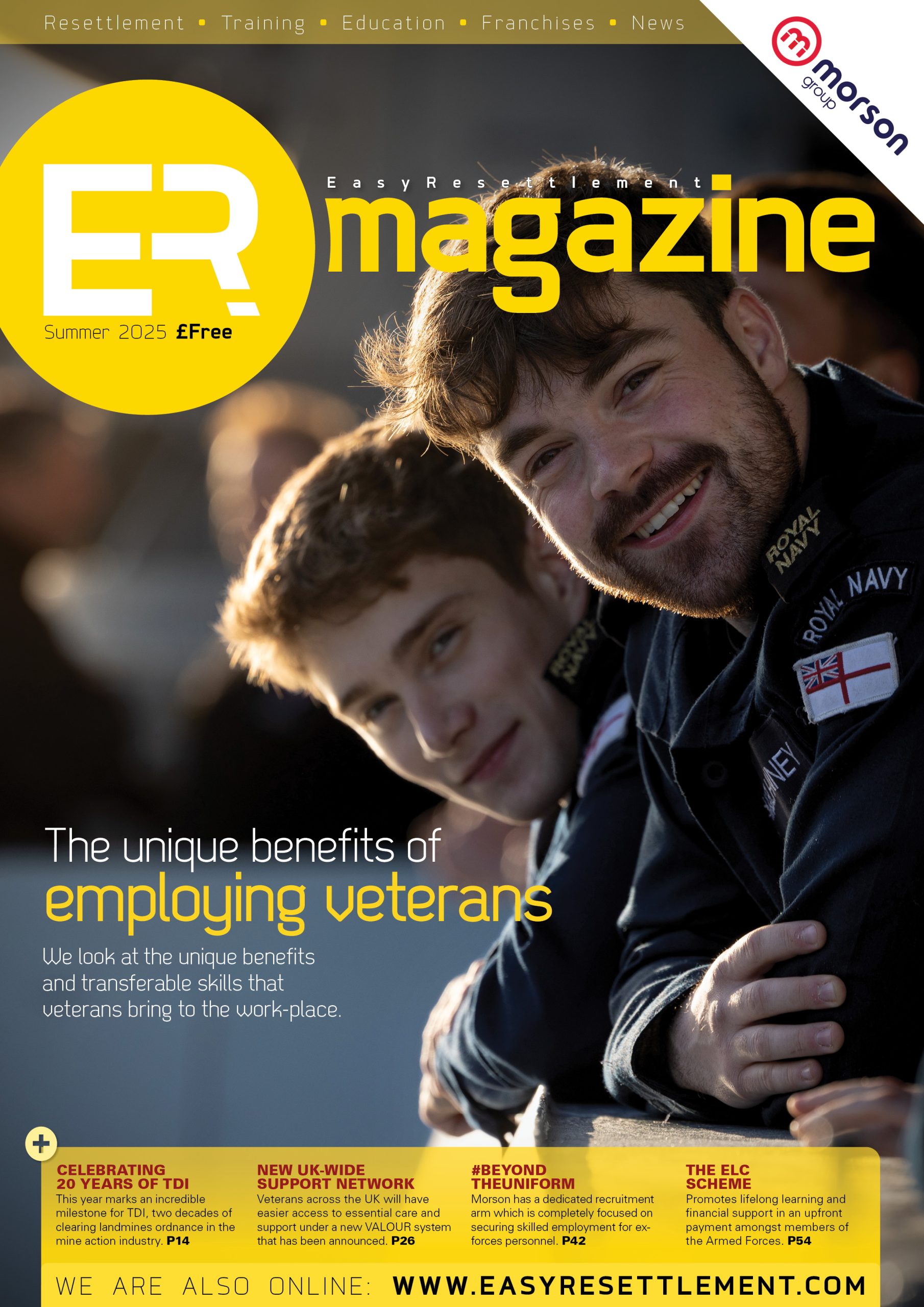Home for Christmas
There is, of course, never a good time to be homeless or be in fear of losing your home, but there are occasions when it’s worse than others.
Take Christmas. It’s not only likely to be colder, but thoughts also and inevitably stray to cheery, fabled images of roaring fires, a table groaning under the weight of food, kith and kin, and hearth and home. That’s the myth, but the reality for some may be very different.
Christmas, like Remembrance Weekend, can be a tough time for military personnel whether former or still serving, and Dean Knowles – late the Royal Anglian Regiment – is no exception.
Dean was supported by SSAFA, the Armed Forces charity through homelessness after finding adjusting to civilian life difficult. It’s not an easy story to read – and includes references to suicide – but ultimately it’s one of hope.
Dean comes from what he describes as a “broken family”, adding: “In the ‘80s that was difficult.
“My parents split up when I was 11. We came home from school one day and my mum had left us.
“My dad was left to bring me, my sister and brother up as well as work a full-time job. He obviously struggled, but seemed to manage to make ends meet.
Dean left school and got an apprenticeship as a mechanic in Boston, Lincolnshire. Although he enjoyed it, he was in a rough area and mixed with the wrong people.
“I knew things were going downhill and I was on a slippery slope, becoming someone I didn’t want to be. I knew I had to think of my future, so I decided, ‘I need to the join the Army’ and as soon as I got in, I loved it. It was definitely the best option for me.”
Dean was 16 when he joined the Royal Anglian Regiment, serving on – after training at Shorncliffe Barracks, multiple tours, including, Northern Ireland, Iraq, and Afghanistan.
His first operational deployment was the tail end of the Gulf War – it goes by many names including Desert Storm, Op GRANBY, the Liberation of Kuwait, but has been relegated to one of the UK’s “forgotten wars” – in early 1991.
“I served in the anti-tank platoon,” says Dean. “We were based there in case of counterattack, but nothing happened so we extracted to Kuwait. After three months in Kuwait, we returned to Germany.”
It’s now 1994, and a bitter, bloody, and again forgotten war in Europe: Bosnia.
It was like there was no humanity
Dean was sent there to serve as part of the United Nations. Of all his tours with the military, he described it as the most “confusing”.
“We were losing people because of landmines and violence. It was one of the worst tours I went on, because we were meant to be keeping the peace and helping people, but we were under constant attack.
“We saw destruction all around, civilians were suffering, but there was no gain. It was like there was no humanity.
“It felt like we lost control of what was happening out there, and we were pulled out and the United Kingdom Land Forces were sent in instead. They took a tougher stance on what was happening out there, and that changed the course of the war.”
Following his time in Bosnia, Dean went back to Germany, which is where his battalion’s operations were run from.
I like to think we made a difference
From there, he served several tours of Northern Ireland, both before and after the Good Friday Agreement.
“It was over the years a strange place to serve, because you exit the big barrack gates, and it is like running into your hometown. Everything is familiar and surreal.
“Despite the Good Friday Agreement, there was of course still some violence and some issues. There were public order concerns and rioters, especially as the marches continue to take place… but I like to think we made a difference there.”
That could have been me
A few years of peace ensued for Dean when, in 2000, he was posted to Warminster for four years, and in 2005, Dean was deployed to Afghanistan.
He recalls: “We were just about to come out of camp one day when an IED hit a bus full of German soldiers. Everyone in the middle of that impact died and others were injured.
“We were in charge of cordoning off the area and investigating it, knowing that two seconds later, that would have been us. I think that affected quite a few people because of the severity and scale of what happened.”
“I and many like me, spent a lot of our careers thinking, ‘That could have been me.’”
2008 saw him deployed to Iraq, tasked with training the Iraqi National Army – including former members of Saddam Hussein’s Bodyguard.
Dean adds: “While I served there, there were incidents happening every day. There were constant IED attacks, and I was lucky that I wasn’t subject to any. But in your mind, you always think ‘What if? What if? What if?’. You constantly question, ‘Is it going to be today?’. Every time you go out, you just don’t know if you’re coming back. So, it does play on your mind quite a lot.
“Remembrance and Christmas are the hardest. I’ve been through so many tours, and I wonder why I made it out of there. I always thought it would be my time, but it didn’t come. And it didn’t matter how good a soldier you were, or how keen you were. You just can’t pre-empt who would be next.
“Me personally, I’ve never spoken to anyone about that though. I probably should have.”
Dean left the Army in 2014 after 25 years’ service. He married, took a job in maritime security, and life seemed on an even keel.
However, he left this work to help his brother run his engineering business. But the business was struggling, his brother was ill – worse than he had disclosed – and later died.
This was 2017. Dean – with a young daughter with Downs Syndrome and going through a divorce – had to close down the business.
“So as things got bad in my marriage, I realised I needed to leave, so she didn’t have to live in an unhappy home. Every penny I had, every part of my pension was in the house, but I just walked away. As far as I saw it, that was Eva’s home. I wanted her to have it. So I left to live in a caravan.”
I’d had enough
Dean lived in the caravan for three years, and it became an isolating environment. He would be with his daughter, Eva, as much as possible but he struggled to cope with what he’d been through. An old back injury from his time in the Army re-surfaced and became debilitating.
After his brother’s death, and tackling all the hardship that life had thrown at him, Dean made a drastic decision in 2018 to take his own life.
“I was still trying to cope leaving the Army, my marriage broke down, I only saw my little girl every other weekend, my brother had died, and I was living in my caravan in pain, unable to sleep.
“One morning I was just like, ‘I’ve had enough.’ I had had thoughts before, but I just decided that was the moment.”
Dean put his plan into action and came close, very close to succeeding, but he thought about Eva.
“I knew I wanted her to have better parents than I had, and I couldn’t give that to her if I wasn’t around, and from that moment I knew I had to sort myself out. Still, all I did was get some medication from the doctors, I still didn’t speak to anyone about what was happening in my mind.”
Not long after Dean’s suicide attempt, he reached out to SSAFA.
Still struggling with his mental health and wanting to “give up” with only Eva to keep him going, he contacted SSAFA’s Forcesline in 2021 to ask for help.
“I emailed the Forcesline team, and they immediately connected me with the branch in Northampton, near where I live.
“I’d been trying to find places to live to get myself sorted but didn’t have any means to get a place. I was introduced to Gayle, a SSAFA caseworker, who jumped into action and helped me really quickly.
“She secured me a deposit and rent for a flat, and funds for furniture too. She arranged for me to have a bed, a settee, a mattress, and a dining table. That was so important to me, so I could eat meals at the table with Eva.
“Gayle was amazing. I didn’t want to reach out because I didn’t want to appear weak or feel embarrassed. I didn’t want to put on anyone. And I felt that there are people a lot more deserving than me. A lot goes through your mind when you ask for help.
“But Gayle put me at ease. She didn’t really give me time to think too much, she just got things sorted for me. She was fantastic. I think if it weren’t for Gayle, then I probably wouldn’t have bothered getting to where I am now. I’d probably have just stuck a backpack on my back and lived a homeless lifestyle, running away from my problems. Within a couple of months, I had everything I could possibly need.”
It’s down to SSAFA that I’m still here
Dean has new employment and a secure home for him and for Eva. He puts this down to SSAFA, and especially Gayle.
“I can’t recommend SSAFA enough to anyone, not just for what they’ve done to me, but what they do for everybody else. And the people that invest into the charity, if it weren’t for them, then SSAFA wouldn’t exist. It’s down to them that people like me are still here.”
For help, contact SSAFA’s Forcesline on 0800 260 6767 or visit ssafa.org.uk/forcesline.

